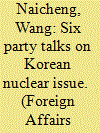| Srl | Item |
| 1 |
ID:
078223


|
|
|
| 2 |
ID:
113614


|
|
|
|
|
| Publication |
2012.
|
| Summary/Abstract |
New works give us glimpses into North Korea, yet little of this translates to how the government frames issues or sees the outside world. In particular, we know little about Pyongyang's nuclear ambitions. This paper proposes data mining using automated content analysis-computer software to analyzes text-to track trends in North Korean rhetoric. Using daily news reports from the Korean Central News Agency (KCNA) for 2010 provides an empirical basis for making claims on how Pyongyang attempts to frame nuclear issues. This paper suggests that North Korea largely identifies nuclear issues with the United States in contrast to the other parties in the Six Party talks. Furthermore, references to nuclear issues, as well as to Kim Jong Un, are remarkably absent during the two major military actions of 2010 (the Cheonan sinking and the shelling of Yeonpyeong island).
|
|
|
|
|
|
|
|
|
|
|
|
|
|
|
|
| 3 |
ID:
065210


|
|
|
| 4 |
ID:
092504


|
|
|
| 5 |
ID:
088447


|
|
|
|
|
| Publication |
2009.
|
| Summary/Abstract |
Northeast Asia is notable for the relative absence of regional institutions. The Six Party Talks could constitute an embryonic starting point for the development of such institutions. The path toward greater institutionalization is likely to begin in a modest fashion. Functional working groups on topics such as the environment, maritime transport, technical barriers to trade, road and rail links, and energy could provide the locus for integrating North Korea into the broader regional and global economies. Foreign ministries will inevitably take the lead in developing the Northeast Asia Peace and Security Mechanism (NEAPSM), but meaningful economic achievements will require the involvement of other ministries. North Korea has proved problematic in this regard thus far. Moreover, given the importance of private-sector involvement in achieving sustainable economic development in North Korea, modalities will have to be developed to integrate private-sector actors when possible. The governments of the region, and particularly China and South Korea, may continue support on a bilateral basis as a hedge against North Korea's collapse or as inducements in the context of the nuclear talks. But the development of more permanent multilateral structures is unlikely until the nuclear issue is resolved.
|
|
|
|
|
|
|
|
|
|
|
|
|
|
|
|
| 6 |
ID:
083864


|
|
|
| 7 |
ID:
068534


|
|
|
| 8 |
ID:
087305


|
|
|
|
|
| Publication |
2009.
|
| Summary/Abstract |
Over the past decade, multiple attempts have been made to curb North Korea's development of a nuclear program. Major world powers such as the United States and China have reached out to Pyongyang through bilateral and multilateral negotiation processes. The Six-Party Talks, the current negotiation mechanism used to discuss options for a potential denuclearization of the Korean peninsula, have brought back hopes that a deal might one day be reached. What type of framework is provided by the Six-Party Talks? How have parties' negotiation behaviors been influenced by the Talks, and how have they in turn impacted the process? Could this negotiation mechanism eventually become more institutionalized? Although this process has not yet emerged as a successful example of an institution that can influence North Korea's determination to become a nuclear power, it has moved beyond its infancy and should be considered a viable tool within foreign policy options.
|
|
|
|
|
|
|
|
|
|
|
|
|
|
|
|
| 9 |
ID:
052410


|
|
|
|
|
| Publication |
Spring/Summer 2004.
|
|
|
|
|
|
|
|
|
|
|
|
|
|
|
|
| 10 |
ID:
106015


|
|
|
|
|
| Publication |
2011.
|
| Summary/Abstract |
The 'hub-and-spoke' alliance structure led by the United States was - and remains - a major feature of security politics in the Asia-Pacific. This article links its 'general interests' with the larger issue of the Asia-Pacific's evolving multilateral regional order. After reviewing the concept of 'hedging', the first section problematises the literature that treats the US-led alliances which constitute the hub-and-spoke system mainly as instruments for the competitive side of a hedging strategy. The second section observes that they go beyond being instruments of threat response to becoming a more complicated network of regional multilateral order-maintenance and order-building. The third section claims that the United States and its regional allies have been utilising the hub-and-spoke alliance structure as a hedge against an undesirable multilateral order emerging in the region. The fourth section examines those arguments with reference to the East Asia Summit (EAS) and the Six Party Talks. The article concludes with some thoughts about what these findings mean for the future direction of the hub-and-spoke alliance structure in the Asia-Pacific.
|
|
|
|
|
|
|
|
|
|
|
|
|
|
|
|